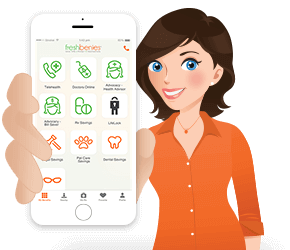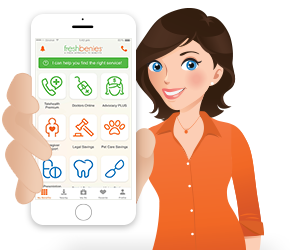5 WAYS TO SAVE ON HEALTHCARE IN 2017 – REALLY!
As consumer-driven Americans, I think we know HOW to be smart consumers, but we don’t apply our normal buying rules to healthcare. And why should we, when there are so many reasons not to? First, it’s a complicated system that most don’t fully understand. Then there’s the fact that pricing isn’t transparent. Finally, the end user (that’s you and me) isn’t paying for the service - instead “insurance is paying for it,” so why do I need to worry about the costs?
Here’s the main reason we all need to take notice: health care costs are skyrocketing, insurance is covering less and we’re being forced to be smarter buyers. And, this is a big expense on your monthly budget line. My family of 5 has seen increases that now make that expense rival our mortgage payment. OUCH! Rather than just accept the increasing costs, there are real actionable steps we can all follow to save hard-earned money and still receive the care our families need.
The team at freshbenies has a combined 154 years in the healthcare and benefits industry – many of us know the system inside and out. So, I thought it would be helpful to share their money-saving tips - and some from a few of our members, too…
1. Know your family’s healthcare needs
One size does not fit all with insurance. It’s important to consider your family’s specific needs and shop accordingly.
Reid puts it this way… “We can no longer use the advice my friend’s dad used to give: ‘just get the maximum amount of insurance available and you should be fine.’ Probably OK advice 30 years ago when insurance was cheap! Most people get their insurance through their employers and are given multiple medical, dental and vision plan choices. Realistically, if you’re healthy, go to the doctor once a year for your check-up and a mammogram (both of which are now 100% covered under most insurance plans), you may just need to have enough insurance for the random catastrophe (God forbid!). Buying more than that could be wasting your hard-earned money. Start tracking how much you spend on your healthcare costs NOW! If you know your typical healthcare needs and expenses, it’ll be much easier to make the right choice for your health AND your wallet when reviewing your choices.
When considering other insurances, be sure to look at the cost of insurance vs. the benefit. If you only have 2 dental cleanings each year, do you really need a $100/month dental policy? Perhaps you can put that $100 a month in savings in case a dental emergency comes up. Click here to read an article I wrote about this.”
2. Pair a Health Savings Account (HSA) with a High-Deductible Health Plan (HDHP)
Sorry, that’s a lot of letters! But Heidi explains what these are and how they can work together to save you some cash…
“First, choosing an HDHP can decrease your annual healthcare expenses. As the name would suggest, these plans have a higher deductible with more out of pocket expenses, so require more cost-conscious decisions. It’s a great option if you’re relatively healthy - these don’t work as well for people with chronic medical issues that require more medical care and costs. When you have this type of plan, the government says you’re also eligible to have an HSA. These accounts allow you to sock away money from your paycheck BEFORE the taxes come out. That could mean 25 to 30% more money. Then, the account can be used for allowable health expenses. It’s like getting a discount on your health expenses. I don’t know about you, but I like getting discounts on stuff I hate to buy! Today, most Americans aren’t taking advantage of these accounts. They’re pretty easy to set up and use, so check into it! When you pair an HDHP and HSA, you’re saving two ways: paying less premium for your HDHP insurance plan and paying less for your actual healthcare.”
3. Be informed to use your benefits wisely
Recent studies confirm many of us don’t know as much as we should about the benefits included in our health plans. Does my plan pay for annual screenings? Will it help with the additional testing my doctor recommended? Using benefits effectively for both our care and our pocketbooks is hard if we don’t know answers to such questions. Jadd points out, “We spend days upon days of our time researching, asking questions, and test-driving when we’re shopping for a car, but we don’t even look for an alternative provider when the doctor says we need an MRI. Advocacy and transparency services can help you navigate the system and make the best decisions with your time and money."
Jeff’s story is a great example of how being informed pays off. “I needed an MRI and knew the prices varied wildly from location to location. I called the Personal Health Advisor and asked them to do some research in my local area. Within 20 minutes, I received an email with 3 different locations and the pricing for each. The prices varied from $450 to over $1000, so I'm really glad I called to get the info before blindly walking into the higher priced location!”
4. Consider new options for care
I know the idea of change gets a bad wrap, but change that saves us a lot of headache and money is welcome in my household. Did you know up to 70% of medical issues can be solved over the phone? Why wouldn’t you want to call a doctor to get the help you need with NO COST for the consultation (at least if you’re using the telehealth service through freshbenies)? Terri says, “My biggest tip is the simple saving of the copay for an office visit, not to mention the time I’m saving not having to go to the doctor’s office!” If a prescription is needed, the doctor will call it in to the local pharmacy of your choice!
But what about a more concerning issue? Marti shared her experience with emailing a specialist for advice…
“I received test results in the mail from my doctor showing some abnormal results. I was not sure if it was something I should be concerned about, so I emailed the Doctors Online service to get advice. The doctor asked for some additional information about my test results and then sent me an email explaining the results. He also told me there was nothing to be concerned about at this time and to have the test performed again in 12 months. This saved me the expense and time of another doctor appointment.”
Emailing a specialist to get personalized advice can give you peace of mind on top of saving time and money!
5. Negotiate and check bills for accuracy
When a situation does merit immediate care, Jo Ann’s tip is to choose an urgent care over an emergency room whenever possible. Be sure to select a facility that is in-network with your health plan (but beware, in-network facilities don’t always equal in-network providers). If you must go to the emergency room, Jo Ann reminds us to be proactive about the price tag. “On the rare occasion that I’ve used an emergency room, when the bill arrives, I ask what the discount would be if I could pay it right now. I generally can get about 20% off the top.”
Remember Jeff’s story on how his advocacy expert helped to locate the best price for an MRI? Health advocates can also review bills and negotiate terms of payment. Don’t just assume your medical bill is correct - it’s been estimated that over 40% of medical bills contain errors. Lynne, a member from Georgia shares….
“I had a procedure in January 2013. In December 2013, I received a $1,500 bill I knew wasn’t correct, but who has the time to do the research and make the calls to ensure it gets taken care of once and forever so it doesn’t keep coming back? So, I called the freshbenies Medical Bill Saver. They requested the insurance info they needed from me, did all the work and called me back a week later to let me know they’d taken care of it and I didn’t owe ANYTHING!”
So unless you want to spend the equivalent of a vacation home on healthcare, determine to be a smart consumer and select a mix of plans and services that meet the needs of your family – both from a health and financial standpoint! Stay tuned…next week, I’ll share 5 more tips on ways you can save.
Now it’s your turn! What strategies do you have for saving money on your healthcare? Which of these tips are things you can use going forward? Comment below or email me at jeanette@freshbenies.com.
















